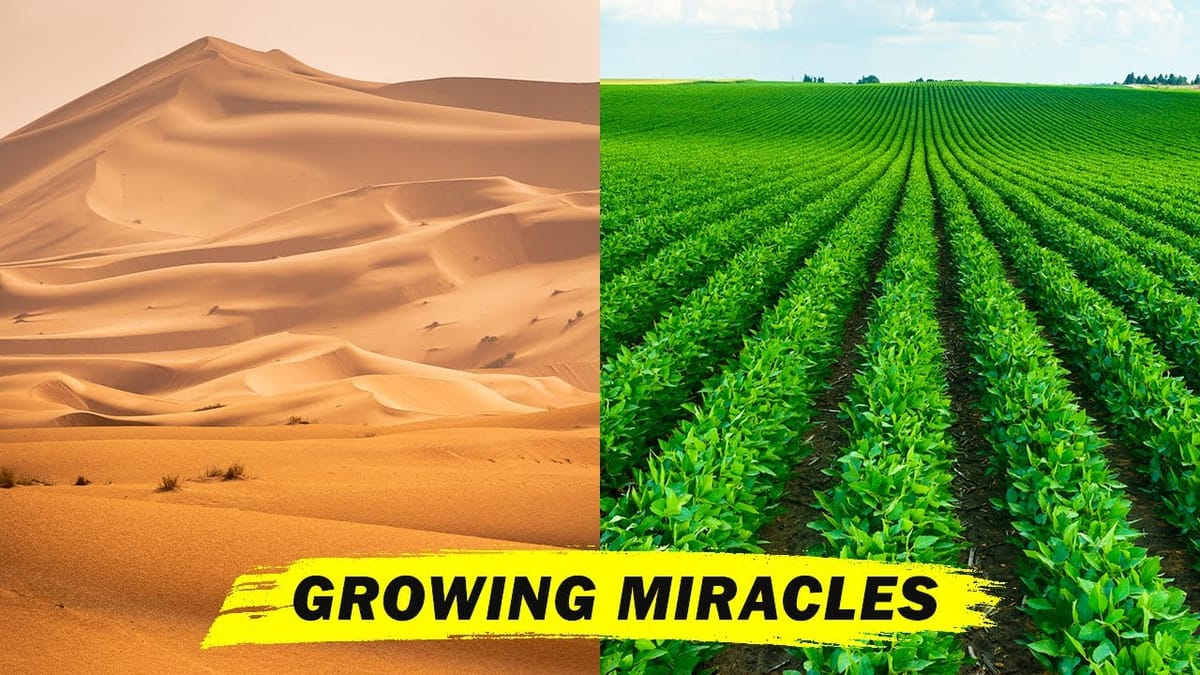Revolutionizing Desert Farming - Israel's Innovative Agricultural Success

Introduction to Israel's Agricultural Miracle
Agriculture in Israel is a highly developed industry, defying the country's desert climate and limited water resources. This remarkable achievement is a testament to Israel's innovative spirit, cutting-edge technology, and forward-thinking approach to farming.
Despite the challenging environment, Israel has emerged as a major exporter of fresh produce, supplying markets around the world with a wide range of high-quality fruits and vegetables. The country's agricultural sector is a significant contributor to its economy, and its success has made it a model for other countries to follow.
Israel's agricultural miracle can be attributed to its pioneering work in agricultural technologies, such as drip irrigation, greenhouses, and crop management. These innovations have enabled farmers to maximize yields while minimizing water usage, making Israeli agriculture a global leader in water efficiency.
Moreover, Israel's emphasis on research and development has led to the creation of new crop varieties, improved farming techniques, and advanced agricultural equipment. This commitment to innovation has positioned Israel as a hub for agricultural expertise, attracting international collaboration and investment.
In this blog article, we will delve deeper into the remarkable story of Israel's agricultural success, exploring the key factors behind its achievements and the lessons that can be applied to desert farming worldwide.
Diverse Farming Practices in Israel
Israel's agricultural landscape is a testament to the country's innovative spirit, boasting an astonishing array of farming practices that cater to its diverse climate and geography. From cutting-edge hydroponic farming to traditional koi farming, the nation's agricultural sector is a vibrant tapestry of techniques and technologies.
Crop Diversity
One of the most striking aspects of Israeli farming is the incredible variety of crops grown across the country. Avocado and orange groves thrive alongside grapefruit, apple, and date palm plantations, while olive groves dot the landscape, producing some of the world's finest olive oil. This diversity ensures a consistent supply of fresh produce to both domestic and international markets.
Livestock Farming
Israel's livestock farming sector is equally impressive, with an array of unusual and exotic species being raised alongside more traditional farm animals. Antelopes, alpacas, and even snails are farmed for their meat, wool, and other products, showcasing the country's willingness to experiment and innovate in agriculture.
This diverse approach to farming has not only made Israel self-sufficient in food production but has also turned the country into a significant player on the global agricultural stage. By embracing innovative techniques and technologies, Israeli farmers have transformed the desert landscape into a thriving agricultural oasis.
Key Factors in Israel's Agricultural Success
Israel's remarkable agricultural achievements can be attributed to several key factors that have transformed the country's desert landscapes into thriving farmlands. Two crucial elements stand out:
1. Close Cooperation and Collaboration
A unique and highly effective partnership exists between farmers, Israel's agro-industry, and technological research institutions. This synergy fosters innovation, knowledge sharing, and mutual support, enabling the agricultural sector to stay ahead of the curve. By working together, these stakeholders can identify and address challenges, share best practices, and drive progress in desert farming.
2. Investment in Research and Development (R&D)
Israel allocates a significant 17% of its budget for agriculture towards research and development. This substantial investment in R&D has yielded groundbreaking technologies and techniques, such as precision irrigation, crop engineering, and soil solarization. These innovations have been instrumental in overcoming the challenges of desert farming, enabling Israeli farmers to cultivate crops in previously inhospitable environments and setting a new standard for agricultural productivity.
Innovative Technologies in Israeli Agriculture
Israel, a pioneer in desert farming, has revolutionized agricultural practices with cutting-edge technologies. The country's innovative approaches have transformed the industry, making it a model for sustainable and efficient farming globally.
1. Use of Drones, AI, and Big Data for Farming
Israeli farmers have adopted advanced technologies like drones, artificial intelligence (AI), and big data analytics to optimize crop yields and reduce waste. Drones equipped with high-resolution cameras and sensors monitor soil conditions, detect early signs of disease, and track crop growth. AI algorithms analyze data to predict weather patterns, soil moisture levels, and fertilizer requirements, enabling data-driven decision-making.
2. Artificial Pollination and Robotic Fruit Picking
Israel has developed innovative solutions for pollination and harvesting. Artificial pollination technologies, such as robotic bees, supplement natural pollination, ensuring adequate crop fertilization. Robotic fruit pickers, equipped with computer vision and machine learning algorithms, identify ripe fruits and pick them at the optimal time, reducing labor costs and minimizing waste.
3. N-Drip's Efficient Irrigation System and BioBee's Biological Pest Control
N-Drip's precision irrigation system delivers water directly to the roots, minimizing evaporation and runoff. This efficient system conserves water and reduces fertilizer use. BioBee, a biological pest control company, uses beneficial insects to control pests, reducing chemical pesticide use and promoting eco-friendly farming practices.
These innovative technologies have positioned Israel as a leader in agricultural innovation, transforming desert farming into a thriving industry. By embracing cutting-edge solutions, Israeli farmers have increased crop yields, reduced environmental impact, and set a new standard for sustainable agriculture worldwide.
Conclusion: A Model for Sustainable Agriculture
Israel's remarkable agricultural success story offers a beacon of hope for sustainable farming practices worldwide. Despite facing numerous challenges, including limited water resources and arid land, Israel has emerged as a leader in innovative agriculture. The country's pioneering spirit, cutting-edge technologies, and collaborative efforts have transformed the desert landscape into a thriving agricultural hub.
This model of success can be replicated in other regions facing similar challenges. By embracing innovative technologies, such as precision irrigation, vertical farming, and crop monitoring, farmers worldwide can optimize resource usage and increase crop yields. Moreover, Israel's emphasis on collaborative research and development, as well as its commitment to knowledge sharing, demonstrates the power of collective action in driving agricultural progress.
As the global population continues to grow, and the threats of climate change and water scarcity intensify, Israel's agricultural success serves as a shining example of what can be achieved through determination, innovation, and cooperation. By adopting and adapting these strategies, countries can ensure a more sustainable and food-secure future for generations to come.


















Comments ()